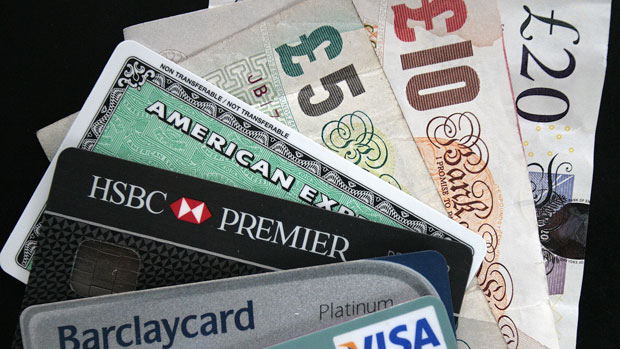January debt: five tips to help make ends meet
How to cope if you’re short on money during long wait for post-Christmas payday

A free daily email with the biggest news stories of the day – and the best features from TheWeek.com
You are now subscribed
Your newsletter sign-up was successful
The final week of January is among the worst for people reaching crisis point because of debt - but help is available.
Many workers are paid earlier than usual in December, which means that on top of the additional expense of Christmas, they face an unusually long wait until their January payday.
According to Sky News, the Citizens Advice Bureau (CAB) is getting a call from someone seeking help every ten seconds on average during this peak debt period. Here are some of the advice network’s top tips for making ends meet.
The Week
Escape your echo chamber. Get the facts behind the news, plus analysis from multiple perspectives.

Sign up for The Week's Free Newsletters
From our morning news briefing to a weekly Good News Newsletter, get the best of The Week delivered directly to your inbox.
From our morning news briefing to a weekly Good News Newsletter, get the best of The Week delivered directly to your inbox.
Make a list of your debts
Start by gathering all the information you have about your debts, which might include rent arrears, credit cards or council tax. For each debt, write down who and how much you owe, when the first payment was missed, any reference or account numbers, and what the creditor has done to get the money back, such as sending letters or court warnings. You can also check your credit reports and whether you are legally obliged to pay up. For example, if six years have elapsed since you made a payment or were in contact with the creditor, you might not have to repay the debt.
Prioritise your debts
The next step is to work out which debts you should deal with first. Rent or mortgage arrears usually come top of the list, since you risk being evicted from your home if you do not pay them, whereas delays in store card and credit card payments can sometimes be more easily negotiated.
A free daily email with the biggest news stories of the day – and the best features from TheWeek.com
Check if you are being paid correctly
See the Gov.uk website to check whether you are being paid at least the minimum wage, or whether your employer owes you any money due to past underpayments. Also check your payslips to see if you have been taxed the right amount and that other deductions are correct. You might be able to claim tax relief for work essentials, such as professional body membership and work tools. The CAB website explains how to find out whether you can claim any government benefits too, or receive help from your local council or charities.
–––––––––––––––––––––––––––––––For a round-up of the most important stories from around the world - and a concise, refreshing and balanced take on the week’s news agenda - try The Week magazine. Start your trial subscription today –––––––––––––––––––––––––––––––
Reduce living expenses
There are many ways you can cut down on basic living costs. Switching to a cheaper deal for utilities such as gas and electricity, broadband and phones is one simple way to make savings. Meters can be fitted to save on water bills, and you might also be eligible for a council tax discount. And if you have credit card debts that are accruing interest then apply for a 0% balance transfer credit card and move your existing debts to the new account.
A railcard could help cut costs for travel, while switching car insurers, sharing car journeys and using supermarket discounts for fuel can help with driving expenses. The Money Advice Service has further helpful advice for cheaper travel.
Budget for debt
The National Debtline offers a budgeting tool to help you plan how to repay debt. Using information from your bank statements, payslips, bills and cash receipts, you can work our how much you have left after paying essential bills and priority debts.
If the law requires you to pay the debt, contact your creditors in writing to confirm the details, to ask them to stop chasing you for payments and to stop adding interest and charges to the amount. Make them a repayment offer and include a copy of your budget. The CAB has template letters for this process.
-
 ‘Those rights don’t exist to protect criminals’
‘Those rights don’t exist to protect criminals’Instant Opinion Opinion, comment and editorials of the day
-
 Key Bangladesh election returns old guard to power
Key Bangladesh election returns old guard to powerSpeed Read The Bangladesh Nationalist Party claimed a decisive victory
-
 Judge blocks Hegseth from punishing Kelly over video
Judge blocks Hegseth from punishing Kelly over videoSpeed Read Defense Secretary Pete Hegseth pushed for the senator to be demoted over a video in which he reminds military officials they should refuse illegal orders
-
 How to juggle saving and paying off debt
How to juggle saving and paying off debtthe explainer Putting money aside while also considering what you owe to others can be a tricky balancing act
-
 4 ways to streamline your financial life in 2026
4 ways to streamline your financial life in 2026the explainer Time- and money-saving steps
-
 Who will the new limits on student loans affect?
Who will the new limits on student loans affect?The Explainer The Trump administration is imposing new limits for federal student loans starting on July 1, 2026
-
 What’s the best way to use your year-end bonus?
What’s the best way to use your year-end bonus?the explainer Pay down debt, add it to an emergency fund or put it toward retirement
-
 Can medical debt hurt your credit?
Can medical debt hurt your credit?The explainer The short answer is yes, though it depends on the credit scoring mode
-
 4 signs you have too much credit card debt
4 signs you have too much credit card debtthe explainer Learn to recognize the red flags
-
 The FIRE movement catches on as people want to retire early
The FIRE movement catches on as people want to retire earlyIn the spotlight Many are taking steps to leave the workforce sooner than usual
-
 How to ditch ‘buy now, pay later’ debt
How to ditch ‘buy now, pay later’ debtthe explainer Recent changes mean BNPL will soon affect your credit score